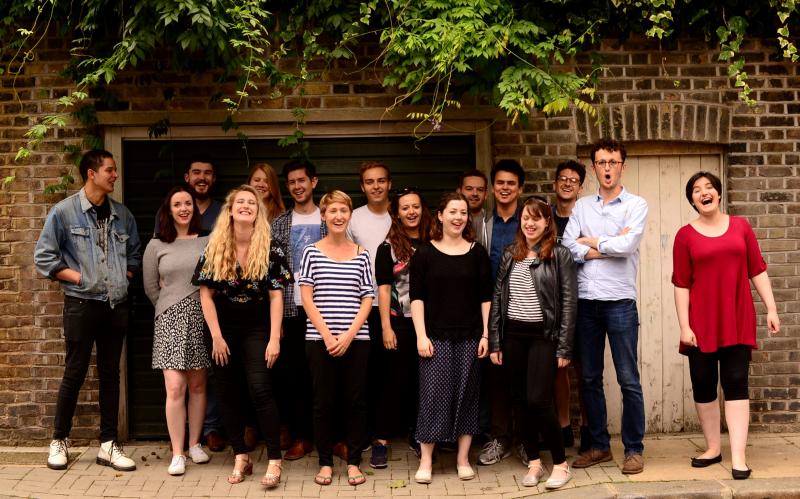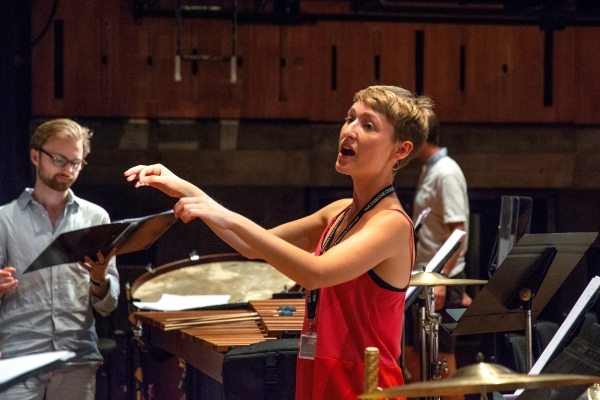Echo Vocal Ensemble, Midlands Arts Centre review - fresh and fun approach to choral singing | reviews, news & interviews
Echo Vocal Ensemble, Midlands Arts Centre review - fresh and fun approach to choral singing
Echo Vocal Ensemble, Midlands Arts Centre review - fresh and fun approach to choral singing
This youthful ensemble concludes its UK tour with a sparkling performance

After meeting on the Genesis Sixteen Young Artist Scheme, this vibrant vocal ensemble has been rapidly gaining momentum since their debut at St John’s Smith Square in 2017. Under the direction of conductor Sarah Latto, the final concert in their UK tour was polished, poised and subtly powerful.
Latto (pictured below by Sarah Turton) is a brilliant conductor, clearly communicating with the singers throughout. She’s also the only person on stage to perform of-book, displaying an innate knowledge and command of every piece. Opening with Hildegard von Bingen’s "O Nobilissima Virditas", the individual vocal lines of the piece were clearly illuminated, while Clemens Non Papa’s "Ego Flos Campi" had a tender, yet driven flow. Jumping forward a few centuries, the group’s improvisation on ANOHNI’s "Why did you separate me from the earth", from her 2016 album Hopelessness was particularly moving, with soloists from within the choir singing individual lines at random, before Latto rounded off the piece with an abrupt but effective finish.  The overarching theme of the programme was the beauty of the natural world, and its precarious position due to the climate crisis. Back in 2019, the ensemble held a competition for emerging composers, asking them to write a piece for the group inspired by the opening lines of Alice Oswald’s Dunt: a poem for a dried up river. It tells the tale of a Roman statue of a nymph, presiding over a dead spring, making vain attempts to conjure water. Last night we heard the joint winning pieces, as well as the two shortlisted works: four very different expressions of this potent text. Rory Wainwright Johnston’s Summoning Dance is a song with no words; in fact, its opening is a vocal work with no singing! Percussive sounds and a series of kazoo-like “vvvvvvs” open the piece, before soprano Sam Cobb - co Artistic Director of the ensemble - comes in with a powerful wordless melody, the song of the water-nymph keening for her lost river. James Brady’s Dunt: a poem for a dried up river had a powerful ostinato with jazz-tinged harmonies layered on top, while Janet Oates’s Summoning made clever use of spoken word. It was Lillie Harris’s already gone which spoke the greatest to me, her dense harmonic language a powerful force in communicating Oswald’s poetry.
The overarching theme of the programme was the beauty of the natural world, and its precarious position due to the climate crisis. Back in 2019, the ensemble held a competition for emerging composers, asking them to write a piece for the group inspired by the opening lines of Alice Oswald’s Dunt: a poem for a dried up river. It tells the tale of a Roman statue of a nymph, presiding over a dead spring, making vain attempts to conjure water. Last night we heard the joint winning pieces, as well as the two shortlisted works: four very different expressions of this potent text. Rory Wainwright Johnston’s Summoning Dance is a song with no words; in fact, its opening is a vocal work with no singing! Percussive sounds and a series of kazoo-like “vvvvvvs” open the piece, before soprano Sam Cobb - co Artistic Director of the ensemble - comes in with a powerful wordless melody, the song of the water-nymph keening for her lost river. James Brady’s Dunt: a poem for a dried up river had a powerful ostinato with jazz-tinged harmonies layered on top, while Janet Oates’s Summoning made clever use of spoken word. It was Lillie Harris’s already gone which spoke the greatest to me, her dense harmonic language a powerful force in communicating Oswald’s poetry.
The ensemble displayed strong synchronicity, from the tender harmonic passages of Weir’s "Verture", the jubilance of Britten’s "Flower Songs" and the gently shimmering close harmonies of Liz Dilnot Johnston’s "For Hester", a beautiful setting of a poem by Philip Larkin. Each singer is clearly an accomplished soloist, but a few more years of singing together as a choir could establish this group as a serious exponent of a capella vocal music. It’s Latto though who is definitely one to watch. Her intricate yet understated conducting and demonstrable affinity with the music highlights her as a stand-out choral conductor.
rating
Explore topics
Share this article
The future of Arts Journalism
You can stop theartsdesk.com closing!
We urgently need financing to survive. Our fundraising drive has thus far raised £49,000 but we need to reach £100,000 or we will be forced to close. Please contribute here: https://gofund.me/c3f6033d
And if you can forward this information to anyone who might assist, we’d be grateful.

Subscribe to theartsdesk.com
Thank you for continuing to read our work on theartsdesk.com. For unlimited access to every article in its entirety, including our archive of more than 15,000 pieces, we're asking for £5 per month or £40 per year. We feel it's a very good deal, and hope you do too.
To take a subscription now simply click here.
And if you're looking for that extra gift for a friend or family member, why not treat them to a theartsdesk.com gift subscription?
more Classical music
 First Person: clarinettist Oliver Pashley on the new horizons of The Hermes Experiment's latest album
Compositions by members of this unusual quartet feature for the first time
First Person: clarinettist Oliver Pashley on the new horizons of The Hermes Experiment's latest album
Compositions by members of this unusual quartet feature for the first time
 Gesualdo Passione, Les Arts Florissants, Amala Dior Company, Barbican review - inspired collaboration excavates the music's humanity
At times it was like watching an anarchic religious procession
Gesualdo Passione, Les Arts Florissants, Amala Dior Company, Barbican review - inspired collaboration excavates the music's humanity
At times it was like watching an anarchic religious procession
 Classical CDs: Camels, concrete and cabaret
An influential American composer's 90th birthday box, plus British piano concertos and a father-and-son duo
Classical CDs: Camels, concrete and cabaret
An influential American composer's 90th birthday box, plus British piano concertos and a father-and-son duo
 Cockerham, Manchester Camerata, Sheen, Martin Harris Centre, Manchester review - re-enacting the dawn of modernism
Two UK premieres added to three miniatures from a seminal event of January 1914
Cockerham, Manchester Camerata, Sheen, Martin Harris Centre, Manchester review - re-enacting the dawn of modernism
Two UK premieres added to three miniatures from a seminal event of January 1914
 Kempf, Brno Philharmonic, Davies, Bridgewater Hall, Manchester review - European tradition meets American jazz
Bouncing Czechs enjoy their Gershwin and Brubeck alongside Janáček and Dvořák
Kempf, Brno Philharmonic, Davies, Bridgewater Hall, Manchester review - European tradition meets American jazz
Bouncing Czechs enjoy their Gershwin and Brubeck alongside Janáček and Dvořák
 Solomon, OAE, Butt, QEH review - daft Biblical whitewashing with great choruses
Even a top soprano and mezzo can’t make this Handel paean wholly convincing
Solomon, OAE, Butt, QEH review - daft Biblical whitewashing with great choruses
Even a top soprano and mezzo can’t make this Handel paean wholly convincing
 Two-Piano Gala, Kings Place review - shining constellations
London Piano Festival curators and illustrious friends entertain and enlighten
Two-Piano Gala, Kings Place review - shining constellations
London Piano Festival curators and illustrious friends entertain and enlighten
 Echo Vocal Ensemble, Latto, Union Chapel review - eclectic choral programme garlanded with dance
Beautiful singing at the heart of an imaginative and stylistically varied concert
Echo Vocal Ensemble, Latto, Union Chapel review - eclectic choral programme garlanded with dance
Beautiful singing at the heart of an imaginative and stylistically varied concert
 Scott, Irish Baroque Orchestra, Whelan, RIAM, Dublin review - towards a Mozart masterpiece
Characteristic joy and enlightenment from this team, but a valveless horn brings problems
Scott, Irish Baroque Orchestra, Whelan, RIAM, Dublin review - towards a Mozart masterpiece
Characteristic joy and enlightenment from this team, but a valveless horn brings problems
 Classical CDs: Voice flutes, flugelhorns and froth
Baroque sonatas, English orchestral music and an emotionally-charged vocal recital
Classical CDs: Voice flutes, flugelhorns and froth
Baroque sonatas, English orchestral music and an emotionally-charged vocal recital
 Kanneh-Mason, Britten Sinfonia, Shave, Milton Court - a grin and a big beaming smile
A pair of striking contemporary pieces alongside two old favourites
Kanneh-Mason, Britten Sinfonia, Shave, Milton Court - a grin and a big beaming smile
A pair of striking contemporary pieces alongside two old favourites

Add comment